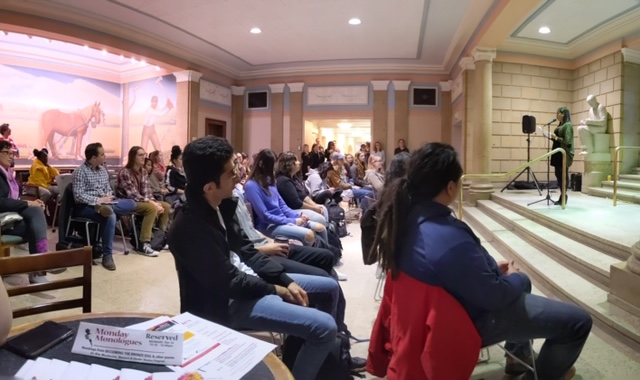Dr. Rita Mookerjee Performs at the Monday Monologues
Author: knguyen1
Author: knguyen1
 By Trinity Jones
By Trinity JonesOn October 14, people gathered in the Grant Wood Foyer of Parks Library, finding seats and talking with friends excited to hear Dr. Rita Mookerjee perform in the Monday Monologues series. After an introduction, Mookerjee wasted no time for the listeners to get comfortable as she walked on stage and delivered the first line from her poem.
“And I know this because I can’t hear anything over the clatter of dead kid bones!”
The poem, titled “There Are Problems in the God Factory,” is a critique of President Trump. Mookerjee’s delivery caused backs to straighten and people to lean forward, eager to hear what she was going to say next, and they remained that way for the duration of her performance.
During the reading, Mookerjee read poems from her chapbook titled, “The Bronze Idol”. The book covers topics including loss of identity due to colonialism, femininity, the tokenization of minority cultures and so much more.
“There are sex poems and there are death poems and Mookerjee makes it clear that one does not exist without the other, in the same way, that many goddesses are deities of both fertility and war,” says Jessie Lynn McMains, Mookerjee’s editor.
Dr. Rita Mookerjee is a Women’s and Gender Studies Associate Teaching Professor here at Iowa State who joined the faculty this year. When she was informed about the opportunity to perform at the Monday Monoglues series taking place, she jumped at the opportunity.
“I was like, ‘absolutely!’ Especially because it was my first semester here and I felt like it was a great way for people to know more about me besides my professorial persona,” says Mookerjee.
Her performance took place on October 14, which was Indigenous Peoples’ Day. When Mookerjee saw that the Monday Monologues landed on that day, she knew she had to perform then.
“I want us to make space and make time to think about decoloniality,” says Mookerjee. “Escaping and working through certain power structures[…]with all that’s going on in the day to day sometimes we can’t think about big-picture issues so I wanted to use that day symbolically to say like let’s do some of this work together.”
Poetry is something that has been apart of Mookerjee’s life for years. Her father attended British military boarding school in India where they had classes on elocution. He gained extensive knowledge of poems that she later grew up hearing him recite. This sparked her love for poetry and later led to her first poetry reading in kindergarten during show and tell.
“I wanted to be different because everyone was like ‘here’s my toy, here’s my favorite whatever,’ I felt like it was kind of boring so I recited a poem,” says, Mookerjee, “It’s kind of a strange thing for a child to do, but that’s pretty much how my life’s been ever since that point.”
Mookerjee’s love for poetry continued from there as she began to write and perform her own poetry during her late middle school years. She used writing poetry as a healthy way of coping with the frustrations and anger that she felt. It was something that she could set aside time to do, something that didn’t require any resources or money. Her passion for poetry flourished when she spent a summer studying the art. She found being in an area with other creative people ranging from dancers, actors, painters, and musicians to be an empowering experience.
“I was like oh, this could just be a performance, this could just be something for others to enjoy as well,” says Mookerjee.
The influence of Mookerjee’s identity as a queer, woman of color is very prominent in her poetry, where she uses her words to encompasses the pain, frustration and appreciation of her identities. In a poem she read, titled “Savasana,” she described the frustration she feels towards “White Woman Yoga.”
“[…]know that I brand you
smiling thief most wicked colonizer
star mandala unalome chain maker
butcher of language burglar of vedas
harbinger of plagues death caller
given the chance you’d suck bloody henna
from my hands and wipe your mouth on my hair.”
It was impossible to ignore the fire that Rita Mookerjee brought into the room with her performance and how it engaged with the audience. There were claps, snaps and head nods all throughout and after the performance. People lingered to give comments, praises and to buy her chapbook. There was even an interaction that stuck with Mookerjee of a young Indian woman who was so excited and touched by her works and bought her chapbook.
“That kind of connection is just priceless,” says Mookerjee.
For those who want to read more of Dr. Rita Mookerjee’s poetry, they can find more at her website ritamookerjee.com as well as on her instagram.